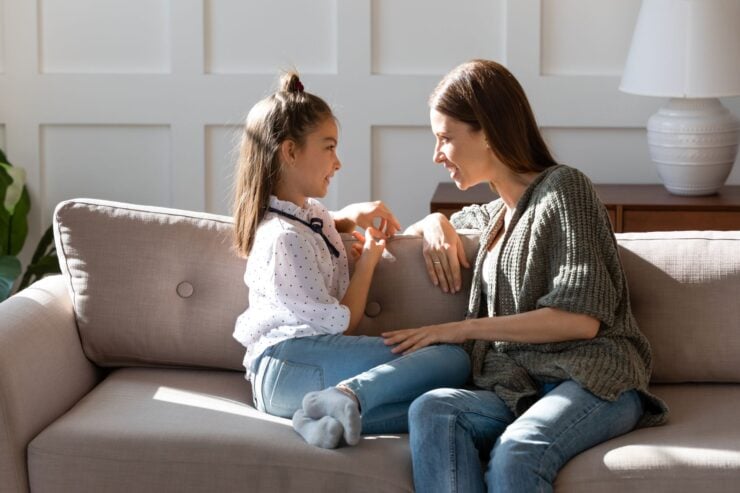How parents can make their children feel more loved
Simply asking and answering personal questions can help

“I’m worried you will die,” my five-year-old would sometimes say at bedtime. Taken aback, I would tell him as gently as possible that I’m still relatively young, very strong, and that it’s a normal part of life that everyone will die, but it most likely won’t happen for a long time. That didn’t really seem to placate him – he’d simply say that he was still worried.
Existential worries are common for children as they start to realise that life is impermanent, especially if they have already experienced death, perhaps of an older family member. Nevertheless, these conversations can be distressing.
I’ve since learnt that I could have responded in a better way, using the conversational technique “reciprocal self-disclosure”: the intentional and mutual sharing of information about yourself.
When adults meet someone new, sharing personal details can build greater intimacy and a feeling of closeness. Self-disclosing can activate the brain’s reward system.
Meaningful conversations between children and parents
A study published last year found that meaningful conversations between parents and children that involve reciprocal self-disclosure tend to make children feel more loved than just engaging in small talk.
“Self-disclosure characterises loving, warm relationships, and those are, of course, critical for child development. But very little was known about how to foster those loving, warm relationships,” explains Eddie Brummelman of Amsterdam University, director of KiDLAB and lead author of the study. “I thought: Let’s use what we know from social psychology about self-disclosure and see if it works with kids and parents as one way to cultivate warm relationships.”
“Self-disclosure characterises loving, warm relationships, and those are, of course, critical for child development.”
Eddie Brummelman
In the study, 218 children and their parents took turns asking questions for about nine minutes. Half were prompted with meaningful questions intended to elicit personal responses, including, “If you could have one wish granted, what would that be?” and “What is the last time you felt alone? What made you feel that way?” The other half were given small-talk prompts, including questions about reading books, inventing a flavour of ice cream, and their favourite food.
The self-disclosure conversations were not necessarily easy. They sometimes prompted anger, anxiety, or sadness, but when asked afterwards, those children indicated they felt more loved than did the children who had engaged in small talk.
Self-disclosure is typically a gradual process, says Brummelman. When you meet someone for the first time, it’s not common to go deep too quickly. Sharing something private tends to take time. That’s why the team prompted the parents and children to start with a more general conversation that gradually became more intimate.
It was also important for the conversation to be reciprocal. “If you encourage your child to self-disclose without disclosing yourself, you don’t establish that basis of trust and equality,” Brummelman says. This is especially important when sharing negative emotions like anger, which might make children feel ashamed until an adult acknowledges having had similar emotions.
“If you encourage your child to self-disclose without disclosing yourself, you don’t establish that basis of trust and equality.”
Eddie Brummelman
Share personal information with children gradually
While some parents routinely disclose their own emotions, many don’t. They may want to appear strong in front of their children or worry that sharing personal information would be humiliating. Or, they may not want to threaten the power hierarchy within the family.
But with very simple prompts, caregivers can help children understand that they have a loving relationship with their caregivers. Interestingly, it didn’t matter how loved the children felt before the experiment; self-disclosure conversations were equally effective for children who had indicated feeling little love from their parents. “So even for those who might feel like their parents don’t love them as much, this could still work.” Brummelman says. “It’s never too late.”
“With very simple prompts, caregivers can help children understand that they have a loving relationship with their caregivers.”
His advice for any parent or caregiver who wants to try this out is to start slowly. It can be time-consuming and emotional to have intimate conversations, but taking time out of your day to connect, perhaps over a meal, and encouraging children, too, to ask questions can help strengthen bonds.
Perhaps a better response to my son’s existential angst would have been to agree that death feels like a daunting prospect, and that I worry about it myself, sometimes, but that in all likelihood we’ll both live for many decades to come. This might have helped him feel even more loved, making him better able to cope with those difficult feelings.
